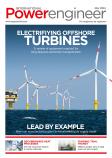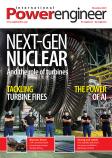More plants are using distributed power technologies to ensure a reliable energy supply. Eugene McCarthy reports
New engine and turbine technologies are focused on highly-efficient distributed generation from environmentally friendly sources such as biogas, and on modular solutions that can be transported to locations with high power density needs.
Distributed power technologies can ensure a reliable energy supply and increase productivity.
Nigerian National Petroleum Corporation’s (NNPC) state oil refinery at Port Harcourt, Nigeria is the country’s largest oil refinery. It has suffered chronic grid outages which affects capacity for refining. Up to now, grid outages have reduced PHRC’s output to 30% of its total maximum capacity of 210,000 barrels per day. The outages and other factors have forced Nigeria to import large volumes of refined petroleum products to meet its domestic needs.
GE’s Distributed Power business is supplying Genesis Electricity’s project company GEL Utility with three 25MW, trailer-mounted, TM2500+ aero-derivative gas turbines to generate uninterrupted power at the refinery which will help the plant return to full refining capacity.
Genesis Electricity, an independent power producer and one of the owners of GEL Utility, signed a 20-year power purchase agreement with NNPC in November 2013 for the installation of GE’s TM2500+ units at the 49-year-old refinery. The TM2500+ gas turbines will provide both the baseload and backup power to support refinery operations. The agreement also includes the future modernisation of Nigeria’s other two refineries.
“We are excited to work with GE to deploy their proven TM2500+ gas turbine technology and help Nigeria successfully return the Port Harcourt refinery to full service as quickly as possible,” said Akinwole Omoboriowo II, ceo of Genesis Electricity. “This project was not only important in getting the refinery back into full operation, but also to support Nigeria’s long-term economic interests by achieving optimum refining capacity.”
“Our TM2500+ technology’s high-power density and compact footprint make it the perfect solution to address Port Harcourt Refining Company’s fast ramp-up, on-site power requirements while also ensuring the refinery’s long-term viability,” said Lorraine Bolsinger, president and ceo of GE’s Distributed Power business.
GE’s TM2500+ gas turbine is capable of providing ISO-rated 31MW of fast and reliable on-site generating capacity. The system can be used to provide utilities with a ‘baseload bridge’ to support permanent power installations; backup power to support natural disaster relief efforts; or for plant shutdowns or equipment maintenance. The fuel-flexible system can use either natural gas or liquid-distillate.
GE launched its new Distributed Power business in February this year, combining three product lines—aeroderivative gas turbines, Jenbacher gas engines and Waukesha gas engines—to better serve the distributed power space and help meet the world’s growing demand for on-site power systems that are easier to finance, faster to install and more efficient and reliable for customers.
MHI group member PW Power Systems (PWPS) has landed a contract with Generación Frías, a subsidiary company of Albanesi, to provide an FT4000 SWIFTPAC unit for its location in Frías, Santiago del Estero, Argentina. This will be the first FT4000 SWIFTPAC in Latin America.
The new FT4000 SWIFTPAC gas turbine generator package offered by PWPS produces the highest output of any aero-derivative engine while maintaining high efficiency. As a next-generation product, the unit builds on over 50 years of aero-derivative experience and more than 2000 industrial gas turbines installed worldwide.
With a modular design that includes proven features of the FT8 SWIFTPAC power plants, the FT4000 engine, powered by a Pratt & Whitney PW4000 derivative gas generator, offers a 60-120MW package of reliable peaking and base-load power in a compact footprint.
The FT4000 is designed for simple-cycle, combined-cycle, or cogeneration applications. The free-turbine design of the system allows for flexible power plant operation down to 25% of full load, synchronous condensing operation without a clutch, and spinning reserve capacity.
"PWPS designed the FT4000 SWIFTPAC to satisfy the growing demand for reliable and efficient gas power plants around the world," said company president Peter Christman. "We’ve had an excellent reception from our current and prospective customers for it, and the continued traction we are seeing with this product demonstrates the confidence of the market in this world-class application."
The unit will be delivered later this year, with commercial operation slated for May 2015.
Distributed power generation specialist Dresser-Rand showcased its new Guascor biogas engines at the recent Green Expo trade fair at the Mexico World Trade Centre in Mexico City.
The SFGLD engine series was specifically developed to work with natural gas, biogas (landfill, sewage, biogas from anaerobic digestion processes), or gases from biomass gasification processes.
The engines can be equipped with mechanical or electronic carburetion control and are adaptable to any type of low heat value (LHV) gas. They have been successfully tested with product gases from many different sources, including landfills, waste water treatment plants, animal manure digestion processes from cows, pigs, chickens, farm waste, cassava, starch, wine dredges, palm oil mill effluent, and more.
The engines, which range from 140 to 1240kW can be supplied as a bare engine, generating set, with cogeneration systems (CHP) separately, or in a fully assembled container unit (noise insulated if required).
Dresser now offers: the naturally aspirated FG Series of lean burn engines which go from 150-238kW (210-319HP); the mechanically carbureted FGLD Series of lean burn engines from 260-800kW (349-1073HP); the electronically carbureted SFGLD Series of lean burn engines from 240-985kW (322-1321HP); the electronically carbureted Miller cyle SFGM Series, from 1055-1100kW (1415-1475HP); and the Miller cycle high efficiency HGM Series, from 520-1350kW (697-1810HP).
The company also offers single- and multi-stage steam turbines. These provide a variety of mechanical and power drive solutions for many industries. Designed to drive generators for independent power plants, compressors and other mechanical equipment for industrial processing and institutional power plants, Dresser says the turbines offer proven reliability and high efficiency.
Available in a number of versatile design configurations, these steam turbines are ideal drivers for process compressors, centrifugal pumps, fans, and blowers used in food processing, ethanol, waste-to-energy, petroleum, petrochemical, paper, biomass, and other industries.
Dresser says the single-stage steam workhorse turbines are cost-effective, easy to install, come in a variety of sizes and configurations to meet client specifications, require minimum maintenance, and are designed for extremely high inlet pressures and temperatures, as well as high exhaust pressures. In addition they meet the requirements of API 611 and 612 and provide efficient generator drive solutions from 500- 4500kW.
Weir and MTU to jointly develop power systems for fracking
Weir Oil & Gas and Rolls-Royce Power Systems company MTU have signed an agreement to develop power systems specifically engineered for hydraulic fracturing.
Weir is a manufacturer of hydraulic fracturing pumps and MTU a leader in heavy-duty industrial diesel engines. The system will be used for hydraulic fracturing operations during the well completion stage of shale oil and gas projects.
The first fully integrated power system is expected to be available to customers in mid-2015.
The agreement outlines the companies’ plans to work together to address the market need for more reliable and continuous duty equipment. A team of engineers is concentrating on optimising the interface of the three most critical components — the engine, transmission and fracturing pump — to truly work as one system. Further, the complete packaged power system will utilise smart controls that provide conditioned monitoring and optimised performance for the operator.
The Weir-MTU announcement builds on Weir’s innovative SPM pumping technology and the performance of the new MTU Frac Pack, which integrates the MTU Series 4000 T95 diesel engine and the ZF 8 TX transmission.
According to Weir Oil & Gas divisional MD Steve Noon, the new relationship will utilise the best technology and service capabilities in the market to provide a total integrated offering.
“This innovative approach will introduce a complete package, with all components built specifically for fracking applications, integrated and optimised to work together, have longer run times and provide greater efficiencies for our customers. It is something the industry has asked for and we are determined to deliver,” he said.
















